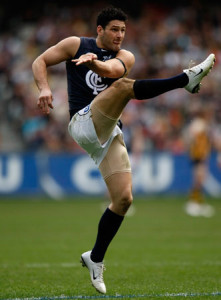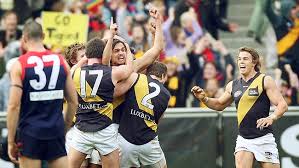During the Brisbane-Carlton game from a few weeks ago, Jonathan Brown, was having a shot at goal from the boundary line – probably some 40-50meters out. The commentators started speculating that, this was perhaps the same spot on the ground at which Brown and his team-mates would bet their lunch money on whether or not they would kick the goal. I remembered another instance in which a clown named Fevola told a story on the The Footy Show hosted by the esteemed and cynical Newman about how he made an impromptu bet with a defender. Mr.Fevola said to his marker something along the lines of, ‘I bet you 100 bucks you’re not on me by the start of the final quarter’. It turned out that the defender was still on him at the start of the last quarter. Fevola, paid handsomely for his appearances on said footy show, made a show of surrendering his 100 dollars cash money. And the rest is history.
Fevola, former full-forward, and when all is said and done, quite a good player, lost his position at Carlton then Brisbane and acquired large gambling debts. Oh don’t call it gambling, call it gaming. That sounds better, after all. I’m not concerned about how or when match-fixing will infiltrate Australian football. I’m wondering about how it already is shaping the game.
***
And then there is tanking: playing not to win. I remember that miserable game between Richmond and Melbourne some years ago. A Richmond player kicked a goal after the siren and was mobbed by his teammates. The Melbourne players were forlorn. Or, well at least they appeared to be. And, sooner or later, the AFL administrators caught a whiff of something awry and slowly, slowly some people were punished. Not severely though, and not those in high enough positions for sure. The rest is history. Dean Bailey was punished and put out of the game for a while. He started to suffer from cancer and then he died. So it goes. Mr.Bailey was not in a good position while coach: his hands were tied. And then, he took the fall. This wasn’t match fixing: it was something a little subtler, but probably equally pernicious. Mr.Bailey was put in a position where it was inconvenient for his team to win. He managed the team – with the support of others – so that it was difficult for the team to win: players were played in peculiar positions, good players were left out of the team, some of their potentially good players were given more time to mature in the lower league. The joke was made that Richmond were so bad they were only just good enough to be a team that was trying not to win.
The primary concerns of fans, coaches and clubs is the win-loss ratio. Yet, this is only part of the thrill and pleasure of sports and gambling. The increasingly intricate bets taken opens up a new area of play within the game. And thus, Fevola is willing to make a bet against the defender being on him at the start of the last quarter. Bets of course are taken on first goal kicker etc etc. Members of the crowd and those watching live can update their bets during their game: as the lead blows out, so do the odds and thus some gamblers may be enticed by the thrill of pulling off an unlikely bet. The bets within the game are the subplots of a match. Instead of passing the ball to someone in a more central position, hypothetically Jonathon Brown might have maintained his desire to kick the goal from the boundary line in order to win a bet against a teammate, just as the commentators were postulating. The goal posts shift from being a desire to win against an opponent dressed in another uniform to one who is dressed in the same uniform.
***
Fevola was excessive in his antics and self-confidence. His proclivity for gambling surely not unusual. In the end he left the AFL with a large debt, a family life in ruins, perhaps having a drinking problem and a reputation as someone who couldn’t keep his life in order. Fevola was also the scapegoat for the poor culture at the Blues. Apparently people thought ‘the Blues won’t win a premiership with Fevola in the team’. And then they got rid of Brett Ratten for a similar reason. And now, with Malthouse in charge, the problem is not the coach, but the cattle. And the culture of the management. But for a while, everything was smooth – it was only Fevola who was the problem.
Gambling is not in AFL as an unwelcome intruder. Gambling, betting, gaming whatever is pervasive within footy culture because it is a part of the daily lives of players and spectators and its money has been welcomed by the game’s administrators as well as those of clubs. And yet, the game’s bureaucracy can still play naive and claim that the game is pure as the driven snow and must be protected against external threats. No, the threats comes from within. Not every gambling player or gambling member of the outer wrecks his or her life in the spectacular manner of Brendan Fevola and that is their privilege. The intricate links between footy and betting invite such predictable outcomes: whether it is one player’s downfall (and that of his family) or a loss of integrity in the playing of the game.



Andy, I am sure that in their hearts the AFL know that the problem has arrived already, they just lack the will to tackle it at this point. Demetriou publicly denied tanking was an issue right up to the point that the AFL brought a case against Melbourne, for tanking.
I expect once the integrity of the game has been affected by gambling, ie once the damage is done, the AFL will act and expect to be lauded as a leader on the issue.